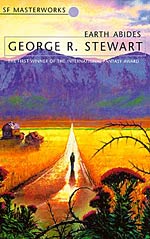
![]() Scott Laz
Scott Laz
12/1/2011
![]()
Stewart sets up an interesting post-apocalyptic scenario by exterminating nearly the entire human race in a matter of weeks with an unknown plague. The point-of-view character, Ish, is doing research alone in a remote location while the plague does its work, and returns to a world with only a tiny number of human survivors, but with plant and animal life still thriving. This set-up allows the author to play with the idea he is clearly interested in: what would happen to the earth if humanity disappeared, leaving pretty much everything we had built up intact? And, how would humanity, now made up of a few very small, widely dispersed groups of survivors, develop from that point on?
Ish and his small "tribe," located in the California Bay Area, do their best to increase the population, while surviving mostly off the leavings of civilization. This ability to mine the past has consequences, however, as the tribe, despite Ish's attempts to encourage them to explore and innovate, does not have the intellectual drive or physical capacity to maintain anything like the pre-plague way of life, and conditions slowly become more primitive as the human-built environment deteriorates, while the survivors and their descendents become increasingly less able to maintain, or even understand, that environment.
Along with this speculation about likely human development under these conditions, Stewart does a wonderful job of evoking the likely environmental changes, both within the story and in a series of italicized asides sprinkled throughout. The deterioration of infrastructure, the likely ecological changes, the fate of domesticated animals--all are thought through convincingly. Especially memorable are the plagues of ants and rats; the end, successively, of electricity, automobiles and drivable roads, and running water; and the ravaging of the tribe by typhoid, emphasizing the end of medical technology.
Ish lives long enough to start to see what the world will be like after all those who remember the pre-Disaster world are gone. I didn't want to believe that humanity would lose its grip on technology so quickly (Ish eventually even gives up on trying to teach the children to read and learn about the past), but in a world with so few people, where everyone is focused on survival and the population is increasingly made up of those who don't remember the world as it was, it does come across as plausible.
Despite what I saw as some clunkiness in the writing style, and some unfortunate sexism, the novel holds up very well over six decades on, and deserves its status as a speculative classic. Any deficiencies are made up for by the very high "food for thought" quotient. Highly recommended!